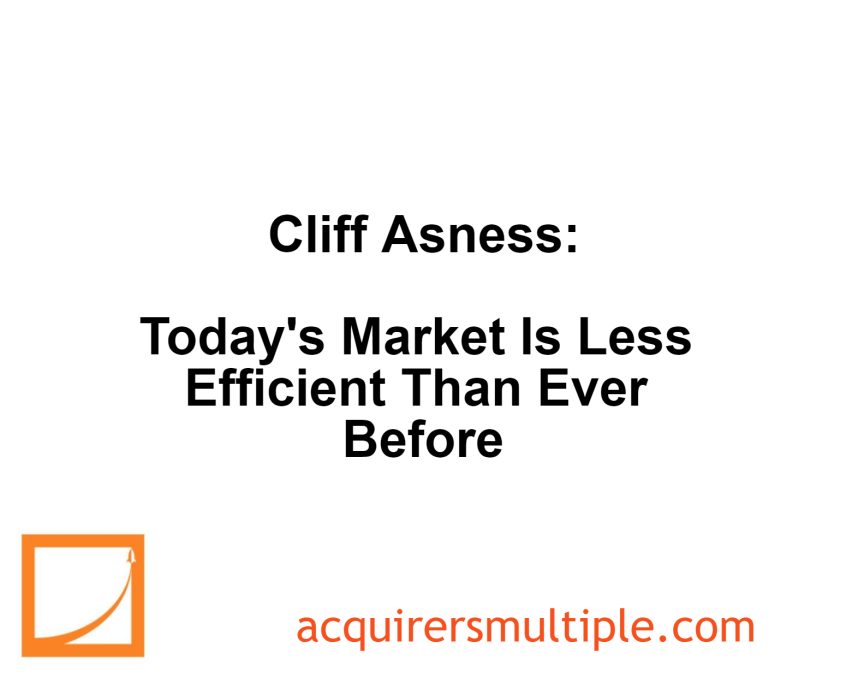In this interview with Meb Faber, Cliff Asness argues that the market has become less efficient despite advancements in technology and information access. He believes the abundance of information can lead to overconfidence and create situations like the meme stock craze. He proposes that the ease of communication can turn a wise crowd into a dependent mob, amplifying biases. While acknowledging the difficulty of proving this theory, he finds it plausible that markets are more prone to bubbles and inefficiencies than before. This presents challenges but also potential opportunities for skilled investors. Here’s an excerpt from the interview:
As you know, I go somewhat the other way on that if I have to go either direction, I would never dain to use that. Actually, I’d use it in a second if it would help me, but that’s not the right argument.
The other one, and I think a lot of people would disagree with this, but I’m not actually certain. I think over my career, the market, call it the relative pricing of stocks, has gotten less, not more efficient.
And that sounds really weird. I think we all think that we live in this whiggish world where things get better, technology gets better, access to information, ubiquity of information, it’s at all of our fingertips. We can trade instantly and at lower costs.
How could that lead to a market getting less efficient?
And I plan on writing about this soon. I’ve been saying that for about two years, so no one should hold their breath because it’s a hard one to write about because there’s not going to be a proof. There’s nothing to point to on this.
Anecdotally, I can say we’ve been in love with measuring the spread between cheap and expensive stocks literally since 1999.
I’m on my 25th year of measuring this thing, and that was the biggest one in 50 years. And by late 2020, we exceeded it.
So in some simple, maybe circular because maybe this started me down this path, but just looking at things, yeah, we think things have gotten crazier twice than we’d ever seen before, but I think the world, and maybe not this table of quants, but maybe if I just sat down with investors in general, who would assume that more information super cheap, instantly delivered with cheap trading costs leads to more efficiency.
I find it very plausible to think that leads to less efficiency, to more overconfidence. I’ve joked that the people who believe this leads to more efficiency, are the same people who believe social media must make us all like each other more.
I don’t think that’s quite happened. If you want to go to an extreme example, and I’m not saying this is a fair example, I’m going to extremes, but the US meme stock example is a great example of people thinking because we have all the information and everyone has the internet and we can all talk to each other. The internet is also a great vehicle for creating manias.
The wisdom of crowds has always been fascinating. If the crowd is independent, and I know you’ve talked about this too, the crowd is independent. Crowds are incredibly wonderful. You always want to poll the crowd if you’re playing with Regis Philban.
He’s since passed. I probably should not have used him as an example, but you can ask the crowd the most esoteric question, very few people know the answer to. It’ll be 35%, get it right, and 65 divided by three get it wrong. And you pick the 35 and you’re going to be right because the signal comes through the noise.
But if the crowd gets to talk to each other, the crowd becomes a mob and the power of polling the crowd completely will go away.
And the internet does a lot of wonderful things and some terrible things, but it’s also made it much easier to turn a wonderfully independent crowd into a highly dependent mob.
So both from real life experience and some scars from battles I’ve won but have still been battles and from observing a lot of these things, I have the probably iconoclastic view that markets are less, not more efficient than when I started my career in the Stone Age.
And frankly, to investors, that’s bad and good news. The bad news is that if things can say some degree of crazy, I don’t think things are always crazy and I object to people who always have a bubble to point to.
But if you think that could happen occasionally, it could happen to a larger magnitude and last longer, making it hard to do the thing we keep referring to. Stick with what you’re doing.
It should also be almost as a tautology, making it more lucrative if you can do it. If you make your money from markets not being perfect, if they’re going to be more imperfect, you’d hope long-term, if you can stick with it, it would make you more money. And frankly, that strikes me as fair.
A world where it’s harder both because it can be more severe and last longer, but you make more if you can do it, strikes me as the fairest thing in the world, but I do think that’s probably a 25%, not a 75% view of mine.
You can watch the entire interview here:
For all the latest news and podcasts, join our free newsletter here.
Don’t forget to check out our FREE Large Cap 1000 – Stock Screener, here at The Acquirer’s Multiple:




